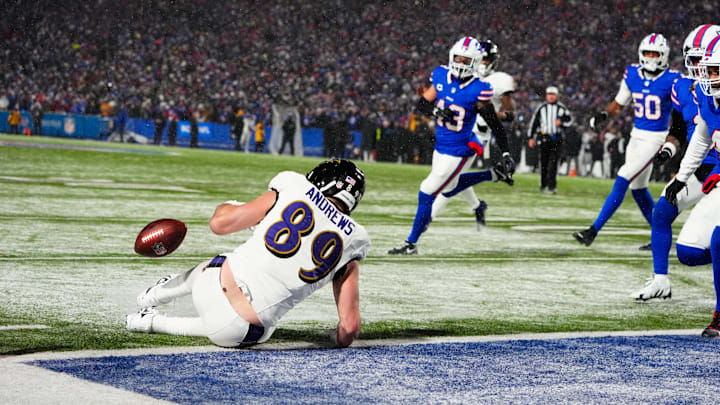The Baltimore Ravens lost to the Buffalo Bills in the divisional round of the NFL playoffs for one simple reason: They didn't protect the football.
In a game where the Ravens outpaced the Bills in most statistical areas, they trailed in the two that matter most: Turnovers and penalties.
As always, there's blame to go around. The bulk of it lands on three individuals:
3. Lamar Jackson
Part of being a quarterback at the highest level of football is shouldering the blame when things go wrong. You can make the plays that put a team in position to win the game, but every mistake along the way will be scrutinized to the max. Lamar Jackson experiences that every time the Ravens fall short in the postseason.
Jackson wasn't at his best, but he still had 254 yards and two touchdowns in the snow while leading his team to the verge of a game-tying two-point conversion. There was a lot of good there, especially in the second half.
Unfortunately for the QB and his team, his mistakes were incredibly costly. Two first half turnovers — via an interception and fumble — resulted in seven Bills points. Jackson was lucky his defense responded so well to his first giveaway, otherwise it would have been much worse.
Any team will have difficulty winning when their quarterback commits two turnovers, especially in a playoff game. Playoff games often come down to which team limits their mistakes. It doesn't matter that the Ravens were 7-of-10 on third down. It doesn't matter that they racked up 416 yards of offense and averaged 7.3 yards per play compared to Buffalo's 273 and 4.6. The QB coughed up the ball twice and that put them behind.
2. Todd Monken
Obviously the Ravens would have preferred not to give up 27 points, but when an offense commits three turnovers that can happen. To their credit, Baltimore's defense buckled down in the second half and allowed just six points. So, I'm not going to blame the defense for this one. The offense? Yeah, that's fair game.
Offensive coordinator Todd Monken has done a fine job getting the best out of Lamar Jackson. He's certainly not responsible for the trio of turnovers and his offense performed rather well statistically. So why is he mentioned here? Let's talk about the Ravens run game.
Baltimore averaged 5.9 yards per carry as a team. Derrick Henry was good for 5.3 yards per while Justice Hill posted an average of 8.3 that was greatly helped by a 22-yard burst.
In snowy conditions, leaning on the run game should have been the obvious game plan. So how did Henry get just 16 carries in a game practically built for his skillset?
Just look at what the Eagles did in sleet and snow in Philadelphia against the Rams. He toted the rock 26 times. That's exactly what the Ravens should have been looking to do as well.
Care to guess what the Ravens' record was this season when Henry had 20 or more carries? That would be 9-0. What about when Henry had 19 or fewer carries? An unsurprisingly 4-6.
Spend time around the fans of a given team and you'll hear complaints about playcallers screwing up by refusing to run the ball. It's an epidemic among otherwise smart and savvy offensive coordinators who end up outthinking themselves. It's very simple: When you have Derrick Henry in your backfield, give him the ball.
1. Mark Andrews
Mark Andrews has served Baltimore well over the last seven seasons. His legacy is strong. But he might not be able to escape being remembered for this particular game. It's the last game he'd want fans to think of when his name comes up.
We might as well start with the big one. Andrews dropped the pass that would have tied the game at 27 points. The Ravens were a two-point conversion away from forcing overtime. The play call was good as Andrews was available in the flat. The read was good as a rolling Lamar Jackson tossed the ball to his tight end. There was one thing left to do. The ball hit Andrews' hands as he fell backwards towards the endzone. He had it...until he didn't
Jim Nantz & Tony Romo on the CBS call for the Mark Andrews drop.
— Awful Announcing (@awfulannouncing) January 20, 2025
"THE BALL IS DROPPED! HE HAD THE 2-POINT CONVERSION IN HIS HANDS! ANDREWS DID NOT HOLD ON!" - Nantz
"Oh my goodness." - Romo
"It's shocking." - Nantz
"It's shocking... That's caught 999 out of 1,000." - Romo https://t.co/Hcs8sQaey9 pic.twitter.com/CuWAPZ609w
That drop will live long in the memories of Ravens fans. There's no doubt about that.
It would have been bad enough if that was Andrews' only disastrous moment of the quarter. It wasn't. A few minutes earlier, the tight end caught a ball over the middle of the field but his ball security was poor, allowing the swipe of a defenders' hand to dislodge it from his arm.
The Ravens were driving into Bills territory trailing by five. The fumble gave Buffalo a chance to kill clock and extend their lead to eight with a field goal.
Football is a team game. No one player is singularly responsible for any loss. There are indiviual moments that play a bigger role in the outcome than others. In Mark Andrews' case, his two worst moments of the night made a huge difference.
